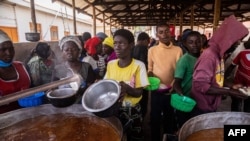Kenya on Monday hosted leaders from the East African Community bloc for discussions on how to stop renewed fighting in the Democratic Republic of Congo.
The insecurity in the region is heightening tension between Congo and Rwanda. Congo accuses its neighbor of supporting the M23 rebel group, a claim denied by Rwanda.
M23 has fought for years to control rich gold and platinum mines found in eastern Congo, where other rebel groups from Rwanda and Uganda are also active.
Tension moved higher recently when a Congolese army soldier was killed inside Rwanda, after firing at security forces at the border post.
Joel Baraka is a conflict and resolution researcher at the Pole Institute, a Congolese think tank. He says Congo’s government sees the EAC as the best route for easing regional tensions.
President Felix Tshikedi, he says, is putting political trust and importance in the East African Community to bring a solution to the crisis and peace in the eastern DRC. He adds Congo also sees Kenya as a mediator between the three countries, including Rwanda and Uganda.
At the meeting in Nairobi, leaders will discuss sending troops from East Africa to help quell the violence.
Last week Kenyan President Uhuru Kenyatta called on deploying regional forces from EAC members, which include Burundi, Kenya, Rwanda, South Sudan, Tanzania, and Uganda and Congo, which joined in March.
Researcher and political analyst Ntanyoma Rukumbuzi says the Congolese army cannot be left alone to solve the armed conflict in the country.
“In case this should be a well-coordinated force under the watch of the UN but also the AU, at some point we need to end the crisis in the eastern DRC. We won't expect the Congolese national army to tackle the crisis because largely it's part of the crisis,” he said.
The regional bloc is considering a plan to deploy troops in three Congolese provinces — North Kivu, South Kivu and Ituri.
Baraka says Congolese will not accept the troops in its territory.
"I don’t think people will accept the troops because there is some opposition to these forces in the parliament, civil society groups are opposing it and they won't accept any forces that involve Rwanda and Ugandan troops," he said.
Amani Tom, a social justice activist agrees. He says regional leaders have denied his country peace.
"We have security forces from the United Nations Peacekeeping mission and many times forces from Rwanda and Uganda come here to find peace but there has been no peace. I think for us to get peace in eastern DRC and the entire country, hypocrisy from the Great Lake leaders must stop and the economic war must stop so that we can build long-lasting peace," he said.
The humanitarian agencies say more than 25,000 people have fled their homes and 5,000 displaced persons and returnees fled to Uganda in the last five days.
The security situation has made it difficult for aid agencies to assess the humanitarian needs of those affected by the conflict.





